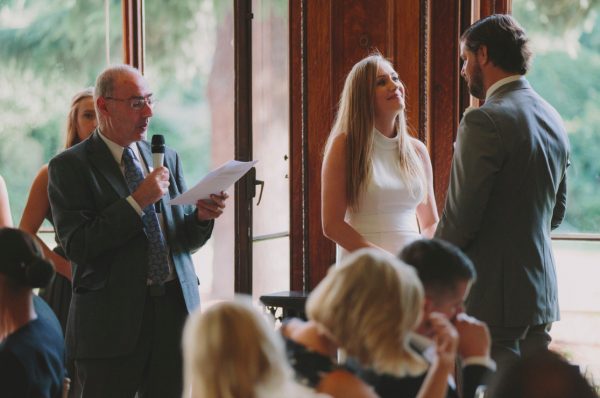
by Michael | Mar 1, 2022 | Blog
What? A Vow renewal? Surely not?!
Although demand has levelled off a bit since COVID, things are becoming a bit more ‘normal’. I have noticed increased interest in Vow Renewals, but the same questions tend to come up. I hope my answers can be useful.
Does a Vow renewal have to take place on the anniversary?
Of course, it’s nice to mark the anniversary on the exact date, but there’s no compulsion. In my experience, people aim for the same week or even month, but I’d gladly celebrate an occasion for my clients whatever the date.
What does a Vow Renewal consist of?
Unlike the wedding ceremony, a Vow Renewal requires no legal paperwork, and there are no obligatory elements. You may wish to include certain rituals (lighting a Unity Candle, for example, or including family members as participants), but there is no set formula. You really can have the ceremony that you want, and your celebrant will be happy to advise and guide you.
Where should a Vow renewal take place?
Again, there is no obligation as regards the venue. You can hold the ceremony by the side of your favourite canal, or in your back garden. You can hire a hotel or manor house. It’s entirely up to you.
Why bother with a Vow Renewal?
There are numerous reasons to celebrate the occasion.
Your anniversary year may end in a 5 or 0.
You may want to proclaim your mutual love publicly.
Things may have changed since your marriage (eg your vows), and you’d like to update the position.
Your family may have altered (children?) and you’d like a ceremony to reflect that.
You simply want a big celebration!
How does it work?
You would organise the event like any life-cycle occasion. So you’d need to settle on a venue, send out invitations, possibly arrange catering, and the like. For the ceremony you may well want a civil celebrant, who can help you to put together a fantastic ceremony that’s perfect for you, and who will conduct it memorably.
So don’t delay! Speak to your favoured civil celebrant and arrange something that everybody will love. We all need a bit of cheering up, and this is a very good way to do it!
photo: mckinley_rodgers.com
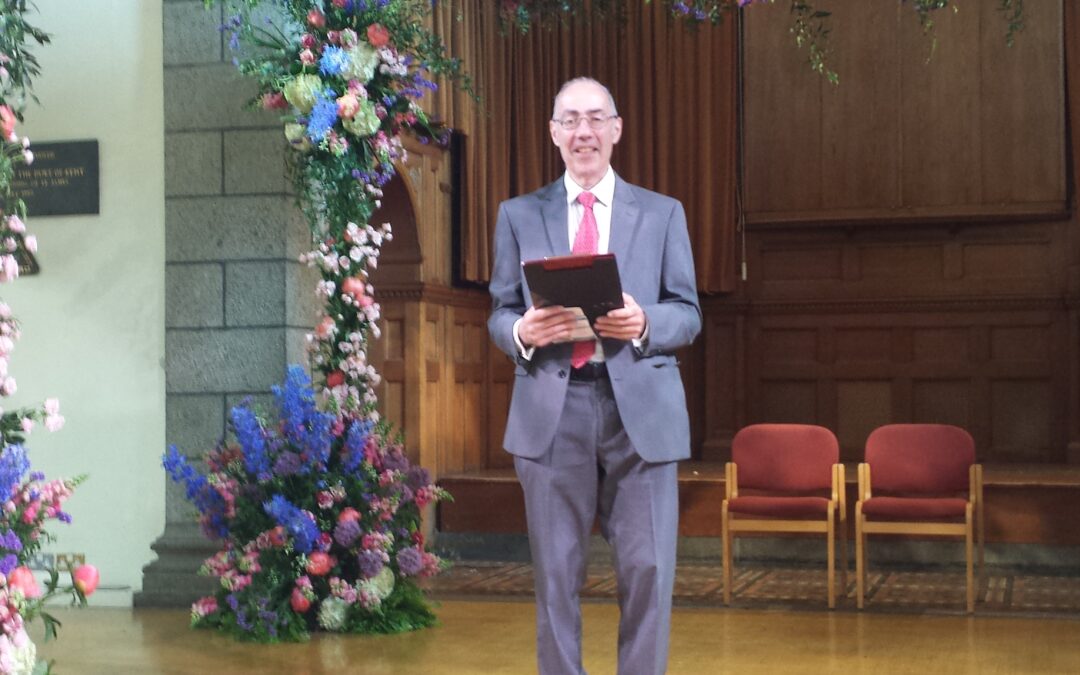
by Michael | Apr 20, 2021 | Blog
I’m often asked what is my role. How can I conduct a wedding? Surely, that’s got to be either a priest (or equivalent) or else the registrars?
What people often don’t realise is that those are not the only options.
As we’ll find out, there’s also a civil celebrant (like me!) who can do the job.
Religious
If you opt for a full religious service in England & Wales, then of course you go to your church (or equivalent). They will explain all that’s involved. Not every branch of Christianity is catered for here, though. Church of England, Quaker or Jewish are the only types of religion included.
For other sects, you can marry in a non-C of E church (say), but the marriage will not be legal until you have made an appointment and been to the Register Office. Without the registrars’ participation and the pronouncing of certain words, you will not qualify as legally wed.
Civil
If you choose the civil route, you need to know that the service must be totally non-religious. You can be sure that it will be a totally secular ceremony, even though the content may vary a bit from registrar to registrar.
The Register Office service will cost in the region of £100. Pre-COVID, they could come out to a venue licensed for weddings, albeit for another £500 or so. As I write, this is no longer possible, and, anyway, wedding numbers are still limited severely.
Celebrant
There is another option, however, which all too few people know about. It is particularly useful if:
- You may not want a full religious service
- You may want one, but are prevented from marrying in your church/synagogue etc. For example, you are a (Catholic) divorcee or yours is a mixed-faith ceremony
- You (or even your parents!) want to have just a smidgen of religion in your service
Note that, a humanist celebrant, like the registrars, will not allow any religious references. So go for an independent celebrant, and you can enjoy a personalised ceremony with as much or as little religion as you want.
Again, this is not a legal ceremony, so you still have to go to the registrars. Afterwards, you can enjoy the ceremony you actually want, compiled and conducted by your civil celebrant. It can be in the venue of your dreams, and, to all intents and purposes, be your actual wedding. It can reflect your personalities and beliefs, with inspiring spiritual – or even funny – readings, and contain personalised sections, such as self-written vows.
So don’t go thinking that your big day can’t be the way you want it! Because it can!
Have a chat with me, and I’ll show you how.
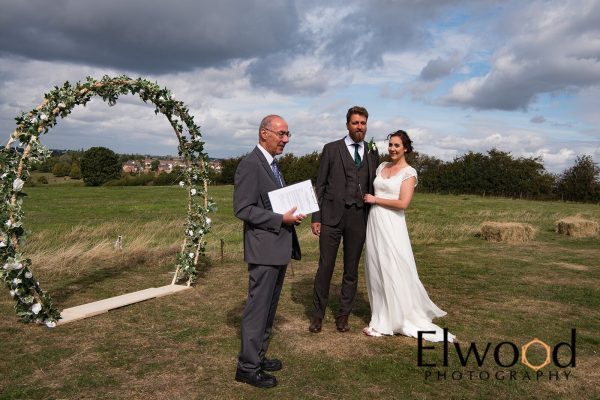
by Michael | Aug 10, 2020 | Blog
A traditional full religious service still suits many – although fewer than it used to.
A register office service is limited, not least because it is standardised and barely differs from one couple to the next.
So a lot of people are looking to personalise their wedding ceremony.
Venue
Apparently,
some 16% of UK weddings in 2019 were held in a rustic or woodland setting. Warehouses
(where you’ve got a blank canvas to work from) are gaining in popularity. And
then there are marquees and beaches, not to mention old favourites like hotels
and castles.
You may be taking a gamble with our notorious British climate, but you have a huge range of options as regards venue. Even allowing for social distancing.
Décor
Another way to individualise your wedding is the décor. It can be handmade or simply bear your stamp, offering unique designs. This can apply to invitations, seating plans and general signage.
Flowers
An obvious
way to show individuality and to beautify proceedings is with a show of flowers.
This can extend to a floral arch (as in the photo by Elwood Photography above)
or simply to bridal bouquets and table furnishings.
Attire
Then, of course, there is no obligation to dress in traditional outfits these days. The bride doesn’t have to wear white; the groom may not wear a suit. However, they can each show originality and personality.
An
interesting touch can be small details like coloured socks or a special cravat
for the groom.
Ceremony
As a civil celebrant, I would say this, but the ceremony can be personalised to great advantage. There are lots of examples, but writing your own vows can be great. This is an opportunity to say some very moving things, but also display humour and affection.
There could also be a choice of ritual, and the whole service can reflect the couple’s personalities and beliefs and be very special.
All of this,
especially preparing the ceremony, is something I can readily help you with.
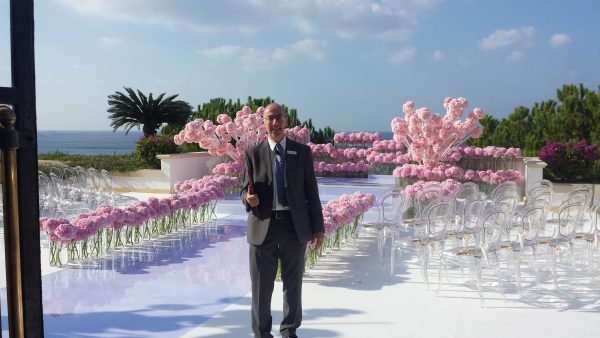
by Michael | Oct 14, 2019 | Blog
I was recently interviewed by a newspaper reporter. Fame at last, I hear you say! However, she was a trainee, and was merely getting in some practice!
However, she asked three questions in particular which seemed worth repeating, so I’ll answer them again in today’s blog.
What is a civil celebrant?
A civil celebrant works with the client to create a totally personalised ceremony, which they then conduct. This could be a wedding, vow renewal, handfasting, naming ceremony, or whatever is required.
Depending on
the type of celebrant, the ceremony can be religious, part-religious or
non-religious.
The celebrant is not normally obliged to produce a standard ceremony. It can be personalised and, thus, unique.
Note that a celebrant-led wedding does not have legal validity in England & Wales (at present), so registrars are still required.
Why are civil ceremonies becoming
increasingly popular?
Probably
because not everyone wants a full religious service. At the other extreme, a
Register Office ceremony is fairly standardised and, of course, completely
secular.
For those who want a hint of religion only, what the civil celebrant offers is ideal.
There are
some (Catholic divorcees, for example) who might welcome a full religious
service and are denied it by the Church, so they can go to a (non-humanist)
civil celebrant.
Others are happy with a secular ceremony, but want something unique (which the Register Office doesn’t offer).
Tell us about some of your unique
experiences and ceremonies
I’ve conducted over 150 ceremonies, and most stick in the mind (usually for good!).
I think two ceremonies are particularly memorable, though.
Firstly, I conducted a September wedding in Cyprus. This involved me reading a couple of paragraphs in Russian (I have a Modern Languages degree, so this wasn’t the hardship it may appear!). The venue was a 5-star hotel, full of flowers, overlooking the sea. A ravishing setting.
However, I also remember the bride. It is understandable that she wanted perfection on her big day, but she came across – at least! – as OCD. Before she employed me, she interviewed me (and sent her parents a recording of me reading Russian). She consistently made unreasonable demands on her groom, humiliating him even in front of suppliers. (If I had been him, I wouldn’t have married her!)
However, she
came up smelling of roses on the day, and it was a fabulous event.
My other favourite was a contrasting occasion. This was also in the open air, much lower-budget, during a very wet January near Salisbury (Old Sarum). The groom was half-Jewish and the bride pagan, and elements of both religions were combined in the service.
Apart from
the setting and the intrinsic interest of the mixed-faith rituals, the weather
was notable. The night before, I had driven through torrential rain for a
couple of hours to reach my hotel. When I drove back after the ceremony, I had
to pass through a severe thunderstorm.
On the morning itself, I arrived early to set up. Unfortunately, the couple were marrying at the Register Office in Salisbury and got caught in a terrible traffic jam, delaying them the best part of an hour. I therefore had to stay on the hilltop for a couple of hours unprotected, at the mercy of the elements. Amazingly, it was quite mild and even stayed dry!
After my moment in the spotlight, I guess it’s just a matter of time before that call comes in from “The Times”!
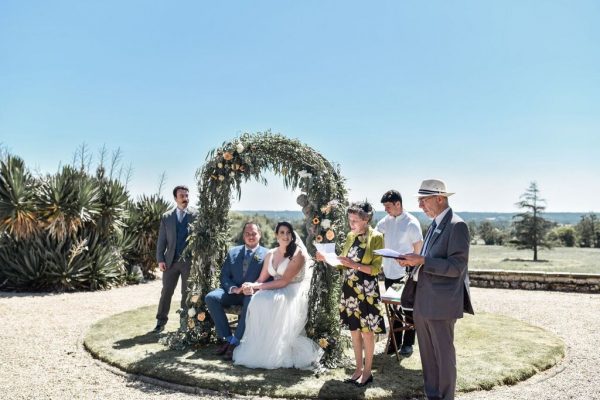
by Michael | Oct 7, 2019 | Blog
Among the questions I am regularly asked are the following:
What is a Civil Celebrant, actually?
The bottom line is that a civil celebrant will personalise your ceremony for you. They should be able to advise you, but will also listen to you. Their goal is to understand your vision of the big day, and tailor a ceremony that reflects your personalities and beliefs and is everything you ever dreamt it would be.
What sort of Ceremonies does a
celebrant offer?
Some specialise in one or two areas only (eg high-end weddings or funerals). However, most will offer weddings, vow renewals, namings, handfastings, funerals, and so on. These may be religious, part-religious or secular, depending on the celebrant.
Why not have a full religious
ceremony?
There’s nothing to stop you having a full religious ceremony led by a celebrant. You’re more likely to go to your own Church (or whatever) for this, though. Moreover, many celebrants are not ordained; however, they may still be willing and able to perform such a ceremony.
Are civil celebrant ceremonies legal?
This is now
under discussion at Parliament. But, at least, for the next few years celebrant
ceremonies in England & Wales have no legal validity. That applies to weddings
or funerals, as these must be legally registered.
There is nothing to stop you getting legally married at a Register Office (by appointment) with two witnesses. You can then proceed – that day or the next – to the venue of your choosing to have the celebrant-led ceremony of your choice. Which, to all intents and purposes, will be your actual wedding.
What makes a celebrant-led ceremony
special?
The celebrant crafts the ceremony together with you. Usually, you will be sent drafts to comment on, and a good celebrant will ensure that you have approved every word of the ceremony by the time the big day arrives.
You may be
encouraged to incorporate rituals (such as handfasting, Unity Candle, stamping
a glass underfoot, etc.) and personal items (how you met, what attracts you to
each other etc.).
You can
include the readings you like (whether spiritual, religious, humorous, or
whatever) and have the people you want participating in the ceremony.
You might write
and recite your vows (possibly, with the celebrant’s assistance).
You work as
a team towards your special, unique ceremony.
How do you choose a really good
celebrant and how much do they charge?
If you don’t have first-hand experience or a reliable recommendation, have a look at the celebrant’s website.
Look at testimonials.
See what the celebrant says and how they say it.
Do you think you will like them? Do you feel you can trust them?
Are they humble enough to listen to you? Will they be competent on the day?
If you think
they are promising, speak to them, preferably face-to-face, and ask the burning
questions you may have. (You can meet a couple of celebrants, and see how they
match up.)
Once you
have decided you want that particular celebrant to share the limelight with
you, only then worry about their cost.
You might find one who undercuts the others considerably, but do you want to take the risk of being disappointed on the day? Nonetheless, it should be pointed out that being expensive does not guarantee quality.
If the celebrant you do want to work with is a little too expensive, can you save some money somewhere else? Or can you pay in instalments?
Of course, you may have other questions; I’m waiting to answer them!





